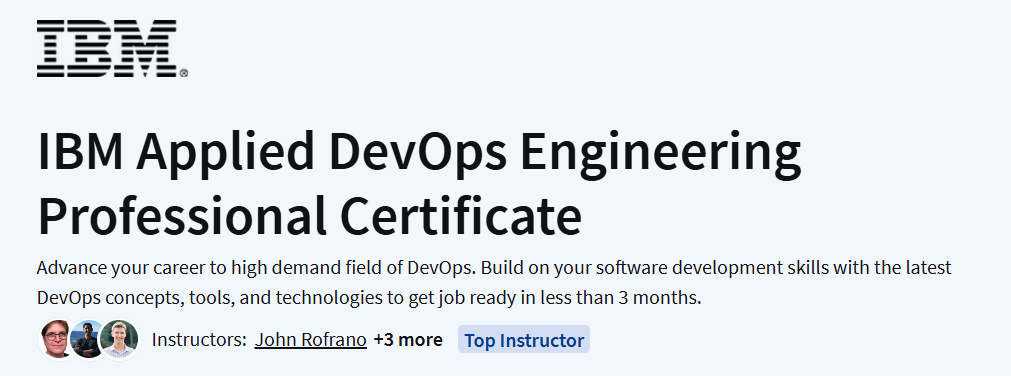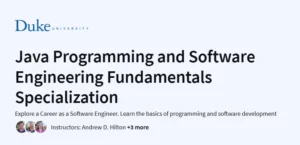What you will learn in IBM Applied DevOps Engineering Professional Certificate Course
- Master Agile methodologies, including writing user stories, sprint planning, and tracking progress using tools like ZenHub.
- Develop RESTful Python microservices, implement Test-Driven Development (TDD), and practice Continuous Integration/Continuous Deployment (CI/CD) using tools like Jenkins and GitHub Actions.
- Deploy applications using container technologies such as Docker, Kubernetes, and OpenShift, and explore serverless computing with IBM Code Engine.
- Implement application security best practices following OWASP guidelines, and gain proficiency in monitoring and observability using tools like Prometheus, Grafana, and OpenTelemetry.
- Build a portfolio of hands-on projects, including a capstone project that integrates Agile planning, microservices development, CI/CD pipelines, and deployment on cloud platforms.
Program Overview
Introduction to DevOps
⏱️ 9 hours
- Understand DevOps principles, including shared responsibility, transparency, and embracing failure.
- Learn about Continuous Integration/Continuous Delivery (CI/CD), Infrastructure as Code (IaC), and TDD/BDD.
Introduction to Agile Development and Scrum
⏱️ 11 hours
- Adopt Agile practices such as small batches, minimum viable product, and pair programming.
- Write user stories, estimate story points, and track progress using Kanban boards.
Introduction to Containers with Docker, Kubernetes & OpenShift
⏱️17 hours
- Learn to build and manage containers using Docker.
- Deploy and orchestrate containers with Kubernetes and OpenShift.
Application Development using Microservices and Serverless
⏱️14 hours
- Understand microservices architecture and its advantages over monolithic applications.
- Create and deploy microservices using Docker containers and serverless technologies like IBM Code Engine.
Introduction to Test and Behavior Driven Development
⏱️19 hours
- Implement unit tests with TDD methods, including coverage reports, factories, fakes, and mock objects.
- Understand the benefits of TDD for DevOps practices.
Continuous Integration and Continuous Delivery (CI/CD)
⏱️14 hours
- Automate CI/CD tasks using Jenkins and GitHub Actions.
- Create Infrastructure as Code scripts using Terraform.
Application Security for Developers and DevOps Professionals
⏱️17 hours
- Develop applications using security by design principles.
- Perform vulnerability scanning and penetration testing with tools like Kali Linux.
Monitoring and Observability for Development and DevOps
⏱️16 hours
- Implement logging and telemetry using OpenTelemetry and tracing with Kubernetes.
- Use monitoring tools like Prometheus, Grafana, and Instana for observability.
DevOps Capstone Project
⏱️18 hours
- Apply Agile planning, microservices development, CI/CD pipelines, and deployment using Kubernetes/OpenShift and Tekton.
- Demonstrate job readiness through a comprehensive, hands-on project.
Get certificate
Job Outlook
- DevOps Engineers are in high demand as organizations seek to improve software development efficiency and reliability.
- Proficiency in tools like Docker, Kubernetes, Jenkins, and Terraform is highly valued in the industry.
- Completing this certificate can lead to roles such as DevOps Engineer, Site Reliability Engineer, and Cloud Engineer.
Explore More Learning Paths
Advance your DevOps and cloud engineering expertise with these curated programs designed to strengthen your automation, deployment, and cloud infrastructure skills for real-world applications.
Related Courses
DevOps, Cloud, and Agile Foundations Specialization Course – Build a strong foundation in DevOps principles, Agile workflows, and cloud technologies to streamline software delivery.
Preparing for Google Cloud Certification: Cloud DevOps Engineer Professional Certificate Course – Gain targeted skills and knowledge to excel in Google Cloud DevOps certification and practical cloud engineering tasks.
DevOps Certification Training Course with Gen AI Course – Learn DevOps practices enhanced with generative AI tools for automation, monitoring, and efficient software lifecycle management.
Related Reading
Support your DevOps journey with structured knowledge and best practices:
What Is Agile Project Management? – Understand how Agile frameworks facilitate iterative development, team collaboration, and efficient project delivery in DevOps environments.
Specification: IBM Applied DevOps Engineering Professional Certificate Course
|
FAQs
- The program spans 9 courses, totaling approximately 120 hours of learning—broken down into modules ranging from 9 to 19 hours each.
- Most learners complete it over 3 months at about 10 hours per week.
- A Coursera FAQ suggests estimates averaging 3 months (approx. 92 h) for completion, depending on your pace.
- The curriculum is fully self-paced, allowing you to accelerate or extend based on availability.
- Though rated beginner-friendly by some sources, it’s actually best for existing software or IT professionals who are already proficient in at least one programming language (Python recommended), Linux/Unix command-line, shell scripting, and Git/GitHub.
- A learner review also suggests it may suit those with existing development or infrastructure experience.
- The program is rich with practical labs and projects, including hands-on work with Docker, Kubernetes, CI/CD pipelines (e.g. Jenkins, GitHub Actions), Agile tools (like ZenHub), microservices, Test-Driven Development (TDD), serverless techniques, application security, monitoring, and observability.
- The capstone project ties everything together—requiring you to plan using Agile, build microservices, implement CI/CD workflows, and deploy using Kubernetes/OpenShift.
- Validated by Credly, the earned badge represents proficiency in DevOps practices, cloud-native technologies, Agile, and CI/CD.
Strengths:
- Receives high user satisfaction, with overall ratings around 4.6–4.8/5.
- Barclay the IBM backing, real-world tools, and job-focused curriculum are seen as major advantages.
Limitations:
- Several learners note that certificates alone don’t guarantee job placement; demonstrated projects matter more.
- One detailed Reddit comment describes deeply frustrating issues with labs around broken instructions, missing dependencies, or technical support—making completion difficult for some learners.
- If you’re a software engineer, operations specialist, or cloud/platform engineer, this certificate delivers practical skills in DevOps workflows and infrastructure.
- Great for building a DevOps portfolio—covering Agile planning, CI/CD pipelines, microservices deployment, security, and observability.
- A certificate adds credibility, especially when coupled with personal or open-source projects illustrating those skills.





